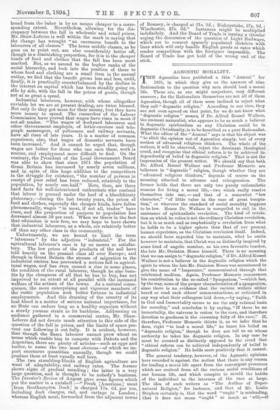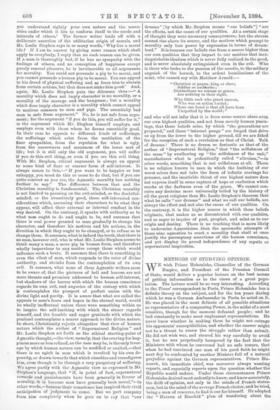AGNOSTIC MORALITY. T HE Agnostics have published a thin "Annual" for
1895, in which they give us the answers of nine Rationalists to the question why men should lead a moral life. These are, as one might conjecture, very different answers ; for the Rationalists themselves are not all of them Agnostics, though all of them seem inclined to reject what they call "dogmatic religion." According to our view, they are not even agreed on that point, for we do not know what "dogmatic religion" means, if Dr. Alfred Russel Wallace, the eminent naturalist, who appears to be as much a believer in dogmatic spiritualism as any Christian could be in dogmatic Christianity, is to be described as a pure Rationalist. What the editor of the " Annual " says is that his object was "to elicit the opinion not of Agnostics simply, but of every section of advanced religious thinkers. The whole of the writers, it will be observed, reject the dominant theological creed, and recognise that ethical reform is to be achieved in- dependently of belief in dogmatic religion." That is not the impression of the present writer. We should say that both Dr. Alfred Russel Wallace and Professor Momerie are believers in " dogmatic " religion, though whether they are "advanced religious thinkers," depends of course on the meaning attached to advance and retrogression. The former holds that there are only two purely rationalistic reasons for living a moral life,—two which really resolve themselves into one,— and that of a somewhat "low character," "of little value in the case of great tempta- tion," or wherever the standard of social morality happens to be low. Hence Dr. Wallace is compelled to call in the assistance of spiritualistic reve]ation. The kind of revela- tion on which he relies is not the ordinary Christian revelation, but it is as much and as emphatically a revelation from what he holds to be a higher sphere than that of our present human experience, as the Christian revelation itself. Indeed, we should have expected him to maintain, what he omits however to maintain, that Christ was as distinctly inspired by some kind of angelic monitor, as his own favourite teacher, the late Mr. Stainton Moses himself. There is no meaning that we can assign to " dogmatic religion," if Dr. Alfred Russel Wallace is not a believer in the dogmatic religion which the spirit to whom the late Mr. Stainton Moses was accustomed to give the name of " Imperator," communicated through that celebrated medium. Again, Professor Momerie commences his contribution to the so.called " Symposium,"—which has, by the way, none of the proper characteristics of a symposium, since there is no evidence that the various writers either heard or read each others' communications, or criticised in any way what their colleagues laid down,—by saying, "Faith in God and Immortality seems to me the only rational basis for morality," and concludes it by saying, "If there be no immortality, the universe is rotten to the core, and therefore devotion to goodness is the crowning folly of the race." If, therefore, Professor Momerie thinks it, as we infer that he does, right "to lead a moral life," he bases his belief on "dogmatic religion," though he does not tell us on whose authority he takes his dogmatic religion. In any case he must be counted as distinctly opposed to the creed that "ethical reform can be achieved independently of belief in dogmatic religion." He holds most positively that it cannot. The general tendency, however, of the Agnostic opinions here recorded is against the notion that there is any reason for leading a moral life apart from the convergent pressures which are evolved from all the various social conditions of our human life, and which conspire to mould the habits of the individual to the interests of the race at large. The idea of such writers as "The Author of Super- natural Religion," for instance, and that of Mr. Leslie Stephen certainly is, that the word " ought " is misleading, that it does not mean "ought" so much as will,—if
you understand rightly your own nature and the neces- sities under which it lies to conform itself to the needs and interests of others.' The former writer leads off with a deliberate assertion of the utilitarian origin of morals, and Mr. Leslie Stephen says in so many words, Why live a moral life ? If I am to answer by giving some reason which shall apply to everybody, I reply that no such reason can be given. If a man is thoroughly bad, if he has no sympathy with the feelings of others, and no conception of happiness except purely sensual pleasure, he is invulnerable to all arguments for morality. You could not persuade a pig to be moral, and you cannot persuade a human pig to be moral. You can appeal to his dread of physical suffering and en force him to abstain from certain actions, but that does not mulre him good.' And, again, Mr. Leslie Stephen puts the dilemma thus :—" A morality which does not imply character is no morality, or a morality of the scourge and the hangman ; but a morality which does imply character is a morality which cannot appeal to motives common to men and pigs. The essentially bad man is safe from argument." No, he is not safe from argu- ment ; for the argument "if you do this, you will suffer for it," is the argument which Mr. Stephen himself employs, and employs even with those whom he deems essentially good. In their ease he appeals to different kinds of sufferings, the sufferings which arise from the mutilation of the finer sympathies, from the repulsion for what is ugly, from the narrowness and meanness of the lower sort of life; but it is still only the old argument, you will suffer if you do this evil thing, or even if you are this evil thing. With Mr. Stephen, ethical argument is always an appeal to some kind of finer or coarser form of self-interest. It always comes to this,—" If you want to be happier or less unhappy, you must do this or cease to do that, but if you are quite content as you are, the Agnostic morality has nothing further to say." The difference between that and the Christian morality is fundamental. The Christian morality is not limited to pressing on the evil-minded, or the doubtful- minded, or the irresolutely good, those self-interested con- siderations which, assuming their characters to be what they appear, will affect their external or internal conduct in the way desired. On. the contrary, it speaks with authority as to what men ought to do and ought to be, and assumes that there is real power granted to man gradually to change his character, and therefore his motives and his actions, in the direction in which they ought to be changed, or to refuse so to change them. It assumes, -what is indeed the truth, that there is no man, however evil, who is what Mr. Leslie Stephen seems to think many a man, a mere pig in human form, and therefore wholly impervious to any motive except those which would influence such a brute. It assumes that there is something in even the vilest of men, which responds to the voice of divine authority, and shrinks from the contemplation of its own evil, It assumes, what none of these Agnostic writers seem to be aware of, that the pictures of hell and heaven are not mere threats and promises addressed to human self-interest, but shadows of the horror with which the human conscience regards its own evil, and auguries of the ecstasy with which iJ contemplates the prospect of perfect union with the divine light and purity. It is aware that what are called the appeals to men's fears and hopes in the eternal world, would be wholly ineffectual unless there were something within us to inspire the self-loathing with which the sinner regards himself, and the humble and eager gratitude with which the penitent contemplates a nearer approach to the divine nature. In short, Christianity rejects altogether that view of human nature which the author of "Supernatural Religion" and Mr. Leslie Stephen set forth as the ethical starting-point of Agnostic thought,—the view, namely, that the craving for hap- piness more or less refined, as the case may be, is the only lever- age by which human nature can be modified or exalted,—that there is no spirit in man which is revolted by his own de- pravity, or drawn towards that which ennobles and transfigures him, even though it be through a very purgatory of suffering. We agree partly with the Agnostic view as expressed in Mr. Stephen's language, that "if, in point of fact, supernatural rewards and punishments have been generally in favour of morality, it is because men have generally been moral,"—in other words,--because their conscience has inspired their vivid anticipation of judgment to come. But we part company from him completely when he goes on to say that "our dreams" [by which Mr. Stephen means "our beliefs "] "are the effects, not the cause of our qualities. At a certain stage of thought they were necessary consequences ; but the stream cannot rise above its source, and the motives which prompt to morality only lose power by expression in terms of dream- land." It is because our beliefs rise from a source higher than our own qualities that they impart to our motives that inex- tinguishable idealism which is never fully realized in the good, and is never absolutely extinguished even in the evil. Who is there who looks to the passion of the ascetic, to the solitary anguish of the hermit, to the ardent humiliations of the saint, who cannot say with Matthew Arnold :—
" Christian or pagan, king or slave, Soldier or anchorite ;
Distinctions we esteem so grave, Are nothing in their sight, Who little rock who pined unseen, Who was on action hurled ;
Whose one bond is that all have been Unspotted by the world;"
and who will not infer that it is from some source above even our own highest qualities, and not from merely human yearn- ings, that those beliefs arise, by which "the generations are prepared," and those internal pangs" are forged that drive us up from the lower to the higher ground, till we are fitted for the reception of such a revelation as that of Christ. Talk of dreams ! There is no dream so fantastic as that of the author of "Supernatural Religion," that "the selfishness of the mass" by swallowing up "the selfishness of the unit," manufactures what is pedantically called "altruism,"—in other words, something that is not selfishness at all. There is no religion known to man in which the loathing of our worst selves does not take the form of infinite cravings for penance, and the insatiable thirst of our highest nature does not express itself in some rapture of hope or exaltation which mocks at the darkness even of the grave. We cannot con- ceive any doctrine more universally belied by the history of
all the great religions than Mr. Leslie Stephen's theorem that what he calls "our dreams" and what we call our beliefs, are always the effect and not also the cause of our qualities. On
the contrary, it is the higher source in which these beliefs originate, that makes us so discontented with our qualities, and so eager to inquire of poet, prophet, and saint as to our
origin and destiny. There is no teaching that is more likely to undermine Agnosticism than the spasmodic attempts of these nine agnostics to erect a morality that shall at once justify the peremptory assertions of the human conscience, and yet display its proud independence of any mystic or
supernatural inspiration.



















































 Previous page
Previous page